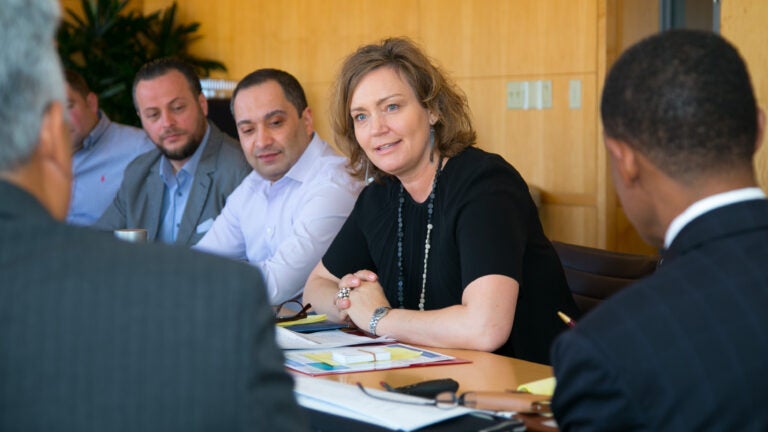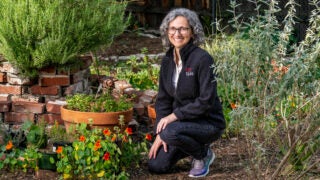
Safe Communities Institute leads discussion to counter violent extremism
Experts from 11 European nations visit USC, exploring the underlying conditions that fuel extremism
The USC Price School of Public Policy hosted a delegation from 11 European countries as part of a continuing effort to share research and exchange ideas relating to countering violent extremism.
This was the fifth and largest group of foreign public officials and leaders of community groups to visit USC through the U.S. State Department’s International Visitor Program, following contingents from Germany, South and Central Asia, Iraq and the Organization for Security and Cooperation in Europe.
“We’re beginning to really increase our presence as a global university, so having such distinguished guests is very important as we begin to shape the debate on different issues,” USC Price Associate Dean Regina Nordahl told the representatives. “I know the topic of homegrown violent extremism is critical for each and every one of you as this becomes a far-reaching matter that we must all work together to address.”
Diverse delegation
Erroll Southers and Frank Quiambao from USC Price’s Safe Communities Institute (SCI) led the discussion on U.S. programs to counter violent extremism, exploring the underlying conditions that fuel extremism, and how different sectors of American society — including government, academia, civil society, religious communities and the private sector — collaborate to resist violent extremism.
“It was the most countries we’ve had in one visit and included a diverse collection of domain experience from law enforcement personnel to social workers,” said Southers, SCI’s director of homegrown violent extremism studies. “There was excellent discussion between the countries themselves about their own comparative analyses regarding what’s happening in their respective locations. That was very unique and enlightening for us.”
Participants in the event came from Albania, Austria, Denmark, Germany, Italy, Macedonia, the Netherlands, Norway, Slovenia, Switzerland and the United Kingdom.
Southers defined the scale of the challenge by noting that more people were killed as a result of domestic terrorism in the United States last year than in any year since the Oklahoma City bombing in 1995. The foreign delegation expressed surprise that only 52 percent of these deaths were attributed to Muslim-influenced individuals, with the other 48 percent from right wing and anti-government extremists groups.
Research on ‘foreign fighters’
A centerpiece of the discussion was the “foreign fighters” research project conducted by Southers with USC Price graduate students in Minnesota last year, where they discovered that people leaving for Syria were not disillusioned, but good students with solid backgrounds from respected families. They gave three reasons for leaving: first, U.S. foreign policy; second, YouTube Rambo-type recruiting videos; and third, their belief that they’re doing something good for themselves and their community.
Most often when they leave, the family doesn’t notify the government, which is part of why better relations with communities are important to stopping homegrown violent extremism.
The way to go is build the trust of the community by interacting with them from the government level.
Frank Quiambao
“We at SCI feel that you cannot go into a community, and just say ‘Hi, we’re the FBI’ or ‘Hi, we’re the police and we’re here to help you,’” Quiambao said. “The way to go is build the trust of the community by interacting with them from the government level, not always with the police, but mental health, education and everything else. Once the people have the trust of the government, then it will work.”
Many of the participants agreed with another finding of hybrid ideologies in radicalized extremists, saying they were seeing the same phenomenon in their countries. Youngsters know they want to do something extreme, but they aren’t tied to one cause.
“What I enjoyed most in the talk is that they are very open to ideas,” said Marc Renfer, chief of investigative section IV terrorism for the Federal Office of Police in Switzerland, about Southers and Quiambao. “They’re not thinking in certain patterns. They have nothing in common with the bureaucrats we often meet in this field. They ask questions as much as we ask questions, so it was an absolutely great discussion.
“They introduced some very interesting conclusions,” Renfer added, “especially about the foreign fighter program and that many of them come from good backgrounds. Also, how the extreme right in the United States is more of a threat because in Europe we don’t usually focus on the extreme right.”
Informing leaders in France, Germany
In addition, Southers recently returned from a trip to France and Germany, where he addressed officials as a homegrown violent extremism (HVE) expert in response to last year’s terrorist attacks in Paris.
During the visit, he spoke with members of the French Prime Minister’s staff, reviewed the security countermeasures at France’s new soccer stadium, met a German group focused on radicalization and foreign fighters, and engaged with Exit-Germany, a program of former neo-Nazis.
“It was a pleasure to speak with counterterrorism colleagues engaged in attempting to understand the dynamics of extremist radicalization and recruitment. I was able to share our field research findings while generating interest in future international HVE efforts,” Southers said. “America should be aware of the professionalism and extraordinary work ethic of state department personnel around the world, particularly in areas where the threat level is unprecedented.”



